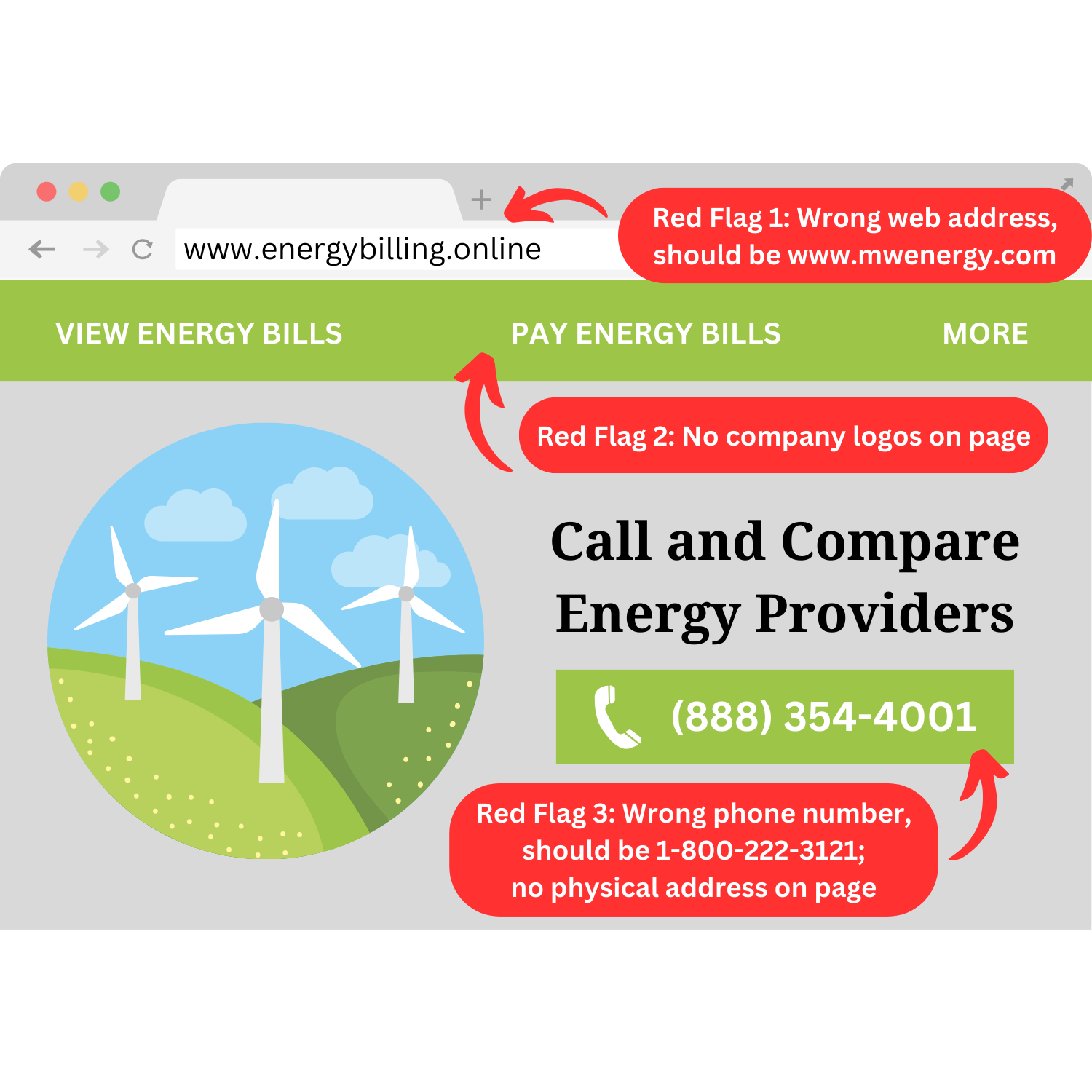Creative Scammers Steal From Customers
Since the start of 2024, Midwest Energy has learned of several customers falling prey to scammers, cleverly using the Internet to scam customers of hundreds or even thousands of dollars.
In a traditional scam that Midwest has been fighting for years, scammers would call customers threatening to disconnect electric service within minutes or hours. Customers are told that they must provide a credit card number, bank account information, or go to a store and purchase Moneypak cards, prepaid debit cards or other gift cards, and provide the numbers over the phone to keep services on.
A New Type of Scam
The new scam works differently. It involves customers trying to reach Midwest online typing certain words into an Internet search engine, such as Google, Bing or Yahoo, using search terms including “utility billing,” “pay energy bill online” and similar. The search engine may deliver several ‘sponsored’ listings at the top of the page. Clicking on them may bring up a website that looks like a generic utility site. Prominently featured will be a toll-free 1-888 or 1-866 phone number, urging people to call to make a payment or inquire about their account. 
This is a departure from the traditional scams, in that the customer calls the scammer and initiates the conversation. The scammer then plays on the customer’s trusting nature, getting them to reveal their Midwest Energy account number, address and other information “for verification.” The scammers then offer to make a one-time payment on the customers account, using the customer’s debit or credit card...and using Midwest Energy’s one-time payment function on its website, actually pay the customer’s bill.
“This is highly unusual behavior for a scammer – to actually make a payment on the customer’s account,” said Justin MacDonald, Midwest Energy’s Vice President of Customer Service. “We’d never seen that before,” he added. “The scammers do this for two reasons – first, to make sure that the credit or debit card number the customer provided is valid,” MacDonald said. “We also think scammers do this to buy time; if the customer believes their energy bill is paid, it might give the scammer additional time to rack up charges or drain the account, because the customer isn’t getting delinquent notices and might not be checking statements.”
In researching this scam, Midwest Energy learned that customers of investor-owned utilities in Kansas also fell victim to this scam last year. In working with Federal law enforcement, it was learned that this scam originates in central Asia. The scammers frequently change website addresses and are constantly using new toll-free phone numbers, helping them stay one step ahead of authorities.
Education is the Best Defense
MacDonald said that the best way to avoid scammers is to be suspicious of anyone who calls you claiming to be Midwest Energy and threatening to cut off service unless immediate payment is made.
“We never call a delinquent customer out of the blue,” MacDonald said. “We start with a letter in the mail to the customer, and then follow up with a phone call.” He added that, “How a customer chooses to pay – bank draft, cash, check or credit card – is up to the customer. We never say it has to be one method over another.”
Next, MacDonald urged customers to avoid using third-party payment sites or apps, as Midwest can’t verify when or if payment was made using a third party site.
“We’ve had instances where customers have claimed they’ve made payments using a third-party app or website, but the payments can arrive late or not at all,” MacDonald said. He encouraged anyone wanting to pay their bill online to only use Midwest’s website, www.mwenergy.com.
“When customers log in to their Midwest Energy account, we can see exactly when payment was made, and processing status of the payment,” MacDonald said. “This reduces errors, and avoids any confusion over whether late fees should be assessed.”
Lastly, MacDonald implored customers to be skeptical of any calls claiming to be Midwest Energy and wanting account information.
“Call ID can be spoofed; your phone may show you’re being called from a number in Hays or Great Bend, but the caller could just as easily be in India,” he said. “If someone calls you claiming to be Midwest Energy and it doesn’t feel right, just hang up and call us at 1-800-222-3121. We won’t take offense, and we’re always happy to talk to customers about their accounts and answer questions about their service.”